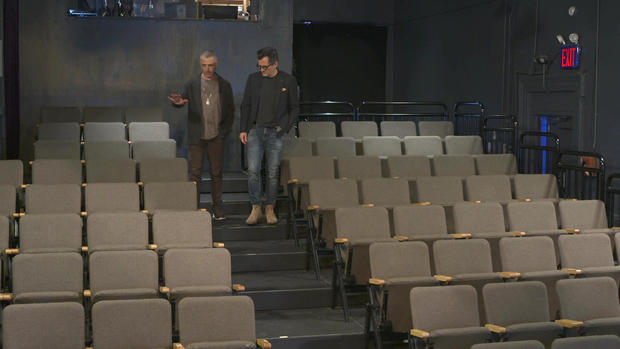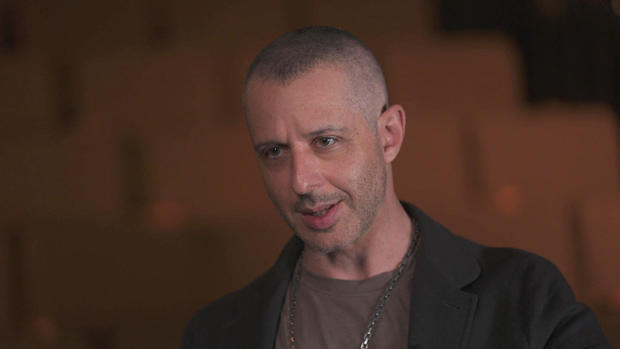Nestled between a New York City church and a small Mediterranean restaurant, the Rattlestick Theater, on Waverly Place, conjures up powerful memories for Jeremy Strong. “I mean, everything has changed, and nothing has changed,” he said, while visiting along with Turner Classic Movies host and “Sunday Morning” contributor Ben Mankiewicz.
Back in 2011, Strong was a struggling actor, appearing there as an Afghanistan war veteran in the off-Broadway play “Paraffin.”
“This was, like, a 60-seat theater, where the bathroom is on the stage, and you could smell the falafel stand downstairs, but it didn’t matter,” he said.
CBS News
More than a decade later, Strong, now 44, is a success story, thanks to his role on HBO’s hit series “Succession,” now winding down its fourth and final season. The show is fictional, but at times seems inspired by some real media dynasties. Strong’s character, Kendall Roy, is the troubled and talented scion of his family’s media empire, one of four siblings desperately seeking their father’s approval.
Watch Kendall Roy (Jeremy Strong) receive a critique of his business acumen from his dad, Logan Roy (Brian Cox), in “Succession”: (Oh, language…)
Mankiewicz said of the Roys, “They’re not the 1 percent, they’re the 0.001 percent. But yet, there are working class families, people all over the spectrum who clearly relate.”
“I find that very moving,” said Strong, “because I think at the heart of it, it’s a story about family and the need for love and the need for validation. So, it’s incredibly universal.”
His character may have grown up with a silver spoon in his mouth and a sense of entitlement in his soul, but Jeremy Strong is not Kendall Roy. Born Christmas Day 1978, Strong spent the first decade of his life in Jamaica Plain, a working class neighborhood in Boston.
Jeremy’s father, David Strong, was everything Logan Roy isn’t – caring, paternal, and heroic, once nearly sacrificing his own life as he walked with his son, then 8, to a neighborhood park, the Arnold Arboretum.
“There was a car coming, like, 40 miles an hour that wasn’t slowing down for the traffic light,” Jeremy recalled. “So, he picked me up and he threw me outta the way. And he got hit by the car, broke all the bones in both of his legs. Saved my life.”
The intensity, and resentment, that we see from Kendall is not a product of Jeremy’s childhood.
“None of that comes from your relationship with your dad?” asked Mankiewicz.
“No,” said Strong, “and I don’t think I understand how I have access to that relationship. There’s not some hidden trauma in my life or my background.”
While visiting his childhood home, which he hadn’t seen in 20 years, the moment seemed to catch Strong off-guard. “It’s just, big feelings coming back here,” he said. “I don’t want to monumentalize it, but in a way these are, like, the waters of childhood.”
CBS News
At around five, Strong started acting in community theater. In high school he got jobs on local movie sets, learning from filmmakers he grew up idolizing. “I worked on ‘The Crucible,’ I worked on ‘Amistad.’ I remember Tony Hopkins, you know, giving his speech as John Quincy Adams. it was incredible. It was incredible.”
He even got to work with Daniel Day Lewis, an uncommonly committed actor who’s had a lasting influence on Strong. He said, “I’m a student, you know, I think eternally, really, and you’re trying to absorb visceral clues from anywhere you can.”
After earning a scholarship to Yale, Strong moved to New York, where he started auditioning, and was barely scraping by. “I don’t think I had anything in my fridge,” he said. “I worked a lot of jobs, waiting tables, room service, shredding paper, anything.”
Most of his acting work came on the stage, off-Broadway. He noted, “There’s inherent value in just doing good work. The feeling of, you know, no one might see you do this play, you’re making 50 bucks a week. But you’re swinging for the fences.”
Then came that play at the Rattlestick: “There was a casting director. She came to see me in this play, and that year I worked on ‘Lincoln’ and ‘Zero Dark Thirty,’ and ‘Parkland’ after. Everything changed.”
CBS News
More movie work followed, before that big break in 2016 being cast as Kendall Roy, which has earned him an Emmy for outstanding lead actor.
The critical praise is due in part to his hyper-focused approach to finding his character’s emotional reserves. On “Succession,” he often isolated himself from the rest of the cast (which is exactly what Kendall would do).
Mankiewicz asked, “So, you’re not a method actor, right? You would say no to that?”
“No. You know, everybody has a method, but I would say mine is always changing, and it’s really just following the line of your intuition that is dictated by whatever you’re working on.”
“Is there a risk in that level of commitment to you personally? The fear I would have is that, you know, you’d burn out?”
“I don’t think so,” said Strong. “Because I find a tremendous amount of joy in doing this.”
A bit of that joy, however, has been tempered. There’s been criticism, fueled by a 2021 headline-making profile in The New Yorker, that Strong’s process can go too far.
Mankiewicz asked, “Did it make you sad?”
“Sure. Yeah. Yeah.”
He’d prefer not to discuss the article – but to his credit, he answered every question “Sunday Morning” asked.
“It made me feel foolish, to be presented in a certain light,” he said. “Do I regret it, what I do? Here’s the thing: would I do anything differently, would I hedge or hold back answers or try to calibrate myself differently? No.”
Strong has found time recently for other projects. The married father of three can afford to be picky now. Next year, he’ll return to a familiar place, the stage, in “An Enemy of the People” on Broadway. “I read it, and I just immediately said, ‘Yes,'” he said.
Web extra: Is Jeremy Strong funny?
But it’s his work on “Succession” that has defined Jeremy Strong for the past seven years. And now, it’s time to let go of Kendall Roy.
Mankiewicz asked, “You’re done now, put Kendall to rest?”
“Yeah. I did. I went home to Denmark where my wife and I have a place, and I went out, sat on the beach, watched Kendall go down with the sunset – adios.”
“You felt that was okay?”
“I’ve been living with this character and carrying, or trying to carry, his struggle for so long,” said Strong. “But I’m happy to be finished, and relieved, and released.”
Watch a compilation of the “best” of Kendall Roy from “Succession”: (more language …)
For more info:
Story produced by Michelle Kessel. Editor: Mike Levine.


